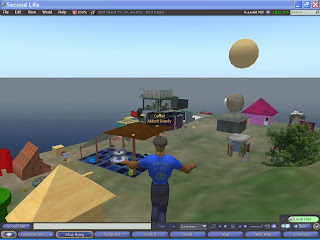
This
month's ASTD Big Question is, again, a series of questions. Apparently one BIG question is not enough for the learning and development community. We aim to exceed expectations.
If you have a to-learn list and are willing to share, and willing to share how you work with that list, that would likely be helpful information.I constantly have a "to-learn" list. Some of the items are necessary and some are "pie-in-the-sky." I tend to have two methods of working on the list. One way is what I call "wandering." Using that technique, I will open up a piece of software or google a term with no real objective just a need to "learn more about" a particular term, item or piece of software. The other method is what you might call "targted." I have to learn how PayPal works, for example, because I am about to do a transaction. Using the targeted method means I have a specific goal in mind and I need to learn how to achieve that goal.
Interestingly, I find the wandering method tends to have better retention than the target. I target learning when I have a specific task but once the urgency of that task is over, I don't retain the learning as well.
Some items on my current to-learn list includes:
- More about 3D Worlds (Wandering)
- Capabilities of Unity 3D (Targeted)
- Better time management techniques (Wandering)
- Creating an online store (Wandering, for now)
- Learning about online publishing (Wandering)
- Some type of 2D game platform (Targeted)
- To program in ALICE (Targeted)
- More about the PA Energy Industry (targeted)
As Knowledge Workers, work and learning are the same, so how does a to-learn list really differ from a to-do list? How are they different than undirected learning through work, blogging, conferences, etc.? I don't totally agree that work and learning are exactly the same, there is some overlap but there are specific things workers need to learn that do not result in a direct work product. For example, a knowledge worker may need to learn how to write a report more effectively but still may produce a report (work product) on time for the boss by working on the weekend. It would be great for the worker to learn to write more efficient reports but learning to do so is not a work product. The products the knowledge worker produces are work.
My to-do list contains items like:
- Write assessment report for DPW
- Write article for magazine
- Meet with students
- Invoice clients
- Conduct training needs analysis
- Create game treatment
I have to learn some things to complete the list but this is not the same as a "to-learn" list. In Catherine Lombardozzi's case, I would argue that she places "to-learn" items on her "to-do" list which I think is great in terms of prioritization as she indicated, I just don't view what I have "to-do" as a work product in the same way as what I have "to-learn" and maybe that is because learning without an expected work product as an outcome is so much more fun.
Are to-learn lists really important to have? Are they as important as what Jim Collins tells us? I think these list are very important to have as all learning and development professionals need to continually be learning. They can be explicit or implicit but, either way, learning professionals should have such a list.
Should they be captured? Is so how? Not sure they need to be captured. I have a bound notebook I carry around for both to-do and to-learn items that I list in the book, sometimes together, sometimes apart. I also write project lists and concepts in the notebook. One place to track and organize my thoughts. Although, I also have a bunch of post-it notes that serve the same purpose so it is not as organized as I make it sound. I live in a whirl wind of chaos with notebooks, post-it notes, to-do, to-learn and project lists. No to mention things written on envelopes, the back of other pieces of paper and in the margins of books...help.
How does a to-learn list impact something like a Learning Management System in a Workplace or Educational setting? Interesting but most LMSs have assignments or course lists which are assigned to a learner based on a due date (for compliance training) or by a managers so the emplopyee can have necessary skills. Both are nice but not as powerful, compelling or satifying as a personnel to-learn list.
What skills, practices, behaviors do modern knowledge workers need around to-learn lists?First, the discipline of writing a to-learn list is a good exercise, second a periodic review of a to-learn list can be valuable and third, I think learning how to network with others to acquire the necessary learning (once identified on the "to-learn" list is important.)
__
Catalog of Recommended Books, Games and GadgetsRecommended Games and GadgetsRecommended BooksContent Guide
















